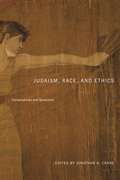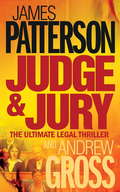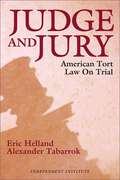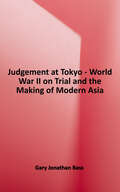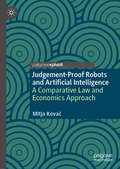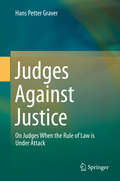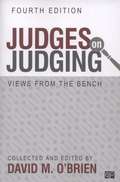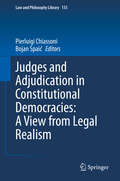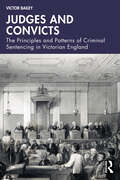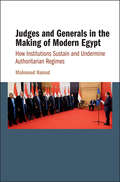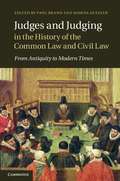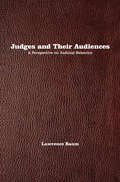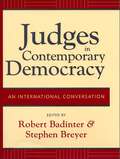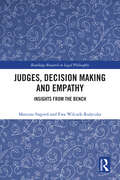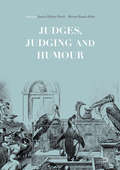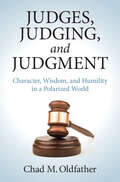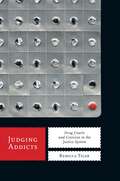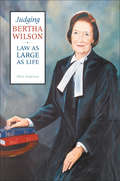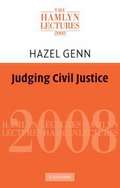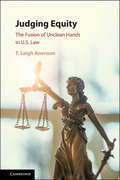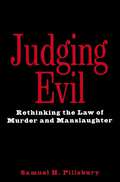- Table View
- List View
Judaism, Race, and Ethics: Conversations and Questions (Dimyonot: Jews and the Cultural Imagination #8)
by Jonathan K. CraneRecent political and social developments in the United States reveal a deep misunderstanding of race and religion. From the highest echelons of power to the most obscure corners of society, color and conviction are continually twisted, often deliberately for nefarious reasons, or misconstrued to stymie meaningful conversation. This timely book wrestles with the contentious, dynamic, and ethically complicated relationship between race and religion through the lens of Judaism. Featuring essays by lifelong participants in discussions about race, religion, and society— including Susannah Heschel, Sander L. Gilman, and George Yancy—this vibrant book aims to generate a compelling conversation vitally relevant to both the academy and the community. Starting from the premise that understanding prejudice and oppression requires multifaceted critical reflection and a willingness to acknowledge one’s own bias, the contributors to this volume present surprising arguments that disentangle fictions, factions, and facts. The topics they explore include the role of Jews and Jewish ethics in the civil rights movement, race and the construction of American Jewish identity, rituals of commemoration celebrating Jewish and black American resilience, the "Yiddish gaze" on lynchings of black bodies, and the portrayal of racism as a mental illness from nineteenth-century Vienna to twenty-first-century Charlottesville. Each essay is linked to a classic Jewish source and accompanied by guiding questions that help the reader identify salient themes connecting ancient and contemporary concerns.In addition to the editor, the contributors include Sander L. Gilman, Annalise E. Glauz-Todrank, Aaron S. Gross, Susannah Heschel, Sarah Imhoff, Willa M. Johnson, Judith W. Kay, Jessica Kirzane, Nichole Renée Phillips, and George Yancy.
Judge and Jury
by James Patterson Andrew GrossAndie DeGrasse, aspiring actress and single mother, does not want to do jury service. But despite her attempts to get dismissed, she still ends up as Juror No.11 in a landmark trial against notorious Mafia Don, Dominic Cavello.Cavello, A.K.A the Electrician, is linked to hundreds of unspeakable crimes and his power knows no bounds. But Senior FBI agent Nick Pellisante has been tracking him for years and conviction is a sure thing. As the jury reaches its verdict, the Electrician makes a devastating move. The entire nation is reeling, and Andie's world is shattered. The hunt for Cavello just got personal, and she and Pellisante join together, determined to exact justice - at any cost.
Judge and Jury: American Tort Law on Trial
by Alexander Tabarrok Eric HellandWith inordinate amounts of money spent in the United States on lawyers and lawsuits and multi-billion-dollar settlements growing each year, the very timely book Judge and Jury asks, "Is the tort system benefiting the public?"In Judge and Jury, the fear of litigation is shown to reduce innovations, drive physicians and manufacturers out of lawsuit-prone specialties, and increase manufacturing and consumer costs. In the courts, data from thousands of cases all over the country demonstrate that tort system awards are driven by political factors such as judicial elections, jury compositions, and the location of courts themselves. This book assembles the unprecedented findings and insights by authors Eric Helland Alexander Tabarrok, who have pioneered economic and legal research into the injustice and enormous costs created by the politicization of the tort law. Seeking to reverse the extremely harmful trends in tort law, Judge and Jury assembles innovative alternatives for reforming the tort system and charts a course toward re-establishing fair civil justice for all in the United States.
Judgement at Tokyo: World War II on Trial and the Making of Modern Asia
by Gary Jonathan BassFrom the author of the acclaimed The Blood Telegram and finalist for the Pulitzer Prize for General Non-Fiction, comes a landmark, magisterial history of the trial of Japan’s leaders as war criminals—the largely overlooked Asian counterpart to Nuremberg. In the weeks after Japan finally surrendered to the Allies to end World War II, the victorious powers turned to the question of how to move on from years of carnage and destruction. For American leaders President Harry Truman and General Douglas MacArthur, Britain’s Winston Churchill, China’s Chiang Kai-shek, and their fellow victors, the question of justice seemed clear: Japan’s militaristic leaders needed to be tried and punished for their crimes. For the Allied powers, the trials were an opportunity both to render judgment on their vanquished foes and to create a legal framework to prosecute war crimes and prohibit the use of aggressive war. For the Japanese leaders on trial, it was their chance to argue that their war had been waged to liberate Asia from Western imperialism and that the court was no more than victors’ justice. For more than two years, the tensions and contradictions of the courtroom could be seen playing out across Asia as the trial unfolded in the crucial early years of the Cold War and the end of the European empires. They have influenced power politics across Asia and the Pacific ever since. Gary J. Bass' Judgement at Tokyo is the product of a decade of research, a magnificent, riveting story of wartime action, dramatic courtroom battles, and the epic formative years that set the stage for the postwar era in the Asia–Pacific.
Judgement-Proof Robots and Artificial Intelligence: A Comparative Law and Economics Approach
by Mitja KovačThis book addresses the role of public policy in regulating the autonomous artificial intelligence and related civil liability for damage caused by the robots (and any form of artificial intelligence). It is a very timely book, focusing on the consequences of judgment proofness of autonomous decision-making on tort law, risk and safety regulation, and the incentives stemming from these. This book is extremely important as regulatory endeavours concerning AI are in their infancy at most, whereas the industry’s development is continuing in a strong way. It is an important scientific contribution that will bring scientific objectivity to a, to date, very one-sided academic treatment of legal scholarship on AI.
Judges Against Justice
by Hans Petter GraverThis book explores concrete situations in which judges are faced with a legislature and an executive that consciously and systematically discard the ideals of the rule of law. It revolves around three basic questions: What happen when states become oppressive and the judiciary contributes to the oppression? How can we, from a legal point of view, evaluate the actions of judges who contribute to oppression? And, thirdly, how can we understand their participation from a moral point of view and support their inclination to resist?
Judges On Judging: Views From the Bench (Fourth Edition)
by David M. O'BrienThoroughly revised and updated for this fourth edition, Judges on Judging offers insights into the judicial philosophies and political views of those on the bench. Broad in scope, this one-of-a-kind book features off-the-bench writings and speeches in which Supreme Court justices, as well as lower federal and state court judges, discuss the judicial process, constitutional and statutory interpretation, judicial federalism, and the role of the judiciary. Engaging introductory material provides students with necessary thematic and historical context making this book the perfect supplement to present a nuanced view of the judiciary.
Judges and Adjudication in Constitutional Democracies: A View from Legal Realism (Law and Philosophy Library #135)
by Pierluigi Chiassoni Bojan SpaićThe book offers contributions to a philosophical and realistic approach to the place of adjudication in contemporary constitutional democracies. Bringing together scholars from different legal and philosophical backgrounds, the book purports to cast light on the role(s) of judges and the function of judicial interpretation inside of constitutional states, from the standpoint of legal realism as a revisited and sophisticated jurisprudential outlook. In so doing, the book also copes with a few major jurisprudential issues, like, e.g., determining the ideas that make up the core of legal realism, exploring the relation between legal realism and legal positivism, identifying the boundaries of judicial interpretation as they appear from a realist standpoint, as well as considering some skeptical outlooks on the very claims of contemporary legal realism.
Judges and Convicts: The Principles and Patterns of Criminal Sentencing in Victorian England
by Victor BaileyUncovering the origins of the new sentencing structure that emerged in the course of the nineteenth century, this book travels from the demise of the "Bloody Code" in the 1830s, through the mid-century transition from convict transportation to home-based penal servitude, and on to the remarkable and unprecedented mitigation of sentencing severity in the final two decades of the century.By providing such an extended span of analysis, this book reveals the discrete stages of development in sentencing policy and practice, and particularly the contribution of the small coterie of professional judges at the county Assizes, the Old Bailey (or Central Criminal Court), and the Middlesex Sessions, around whose sentencing decisions the study revolves. In consequence, readers are offered an overarching survey of the nineteenth-century trends in sentencing, including an account of the struggle between politicians, mandarins, and judges for supremacy in sentencing, along with a detailed explanation of that remarkable mitigation of sentencing severity that ultimately defined a new equation between crime and punishment, or the modern sentencing tariff.Judges and Convicts: The Principles and Patterns of Criminal Sentencing in Victorian England will be of great appeal to students and scholars of history, law, criminology, and sociology, particularly to those with an interest in the history of the criminal trial, the judiciary, punishment, and sentencing.
Judges and Generals in the Making of Modern Egypt: How Institutions Sustain and Undermine Authoritarian Regimes
by Mahmoud HamadWhy do authoritarian regimes survive? How do dictators fail? What role do political institutions play in these two processes? Many of the answers to these questions can be traced to the same source: the interaction between institutions and preferences. Using Egypt as a case study, Professor Mahmoud Hamad describes how the synergy between judges and generals created the environment for the present government and a delicate balance for its survival. The history of modern Egypt is one of the struggle between authoritarian governments, and forces that advocate for more democratic rights. While the military has provided dictatorial leaders, the judiciary provides judges who have the power to either support or stymie authoritarian power. Judges and Generals in the Making of Modern Egypt provides a historically grounded explanation for the rise and demise of authoritarianism, and is one of the first studies of Egypt's judicial institutions within a single analytical framework.
Judges and Judging in the History of the Common Law and Civil Law
by Paul Brand Joshua GetzlerIn this collection of essays, leading legal historians address significant topics in the history of judges and judging, with comparisons not only between British, American and Commonwealth experience, but also with the judiciary in civil law countries. It is not the law itself, but the process of law-making in courts, that is the focus of inquiry. Contributors describe and analyse aspects of judicial activity, in the widest possible legal and social contexts, across two millennia. The essays cover English common law, continental customary law and ius commune, and aspects of the common law system in the British Empire. The volume is innovative in its approach to legal history. None of the essays offer straight doctrinal exegesis; none take refuge in old-fashioned judicial biography. The volume is a selection of the best papers from the 18th British Legal History Conference.
Judges and Their Audiences: A Perspective on Judicial Behavior
by Lawrence BaumWhat motivates judges as decision makers? Political scientist Lawrence Baum offers a new perspective on this crucial question, a perspective based on judges' interest in the approval of audiences important to them. The conventional scholarly wisdom holds that judges on higher courts seek only to make good law, good policy, or both. In these theories, judges are influenced by other people only in limited ways, in consequence of their legal and policy goals. In contrast, Baum argues that the influence of judges' audiences is pervasive. This influence derives from judges' interest in popularity and respect, a motivation central to most people. Judges care about the regard of audiences because they like that regard in itself, not just as a means to other ends. Judges and Their Audiences uses research in social psychology to make the case that audiences shape judges' choices in substantial ways. Drawing on a broad range of scholarship on judicial decision-making and an array of empirical evidence, the book then analyzes the potential and actual impact of several audiences, including the public, other branches of government, court colleagues, the legal profession, and judges' social peers. Engagingly written, this book provides a deeper understanding of key issues concerning judicial behavior on which scholars disagree, identifies aspects of judicial behavior that diverge from the assumptions of existing models, and shows how those models can be strengthened.
Judges in Contemporary Democracy: An International Conversation
by Stephen Breyer Robert BadinterLaw, politics, and society in the modern West have been marked by the increasing power of the judge: the development of constitutional justice, the evolution of international judiciaries, and judicial systems that extend even further into social life. Judges make decisions that not only enforce the law, but also codify the values of our times.In the summer of 2000, an esteemed group of judges and legal scholars met in Provence, France, to consider the role of the judge in modern society. They included Robert Badinter, former president of the Constitutional Council in France; Stephen Breyer, Justice of the Supreme Court of the United States; Antonio Cassese, the first president of the International Criminal Tribunal for the former Yugoslavia; Dieter Grimm, former vice president of the Constitutional Court of Germany; Gil Carlos Rodriguez, president of the Court of Justice of the European Union; and Ronald Dworkin, formerly of Oxford University, now professor of philosophy and law at the New York University Law School. What followed was an animated discussion ranging from the influence of the media on the judiciary to the development of an international criminal law to the judge's consideration of the judge's own role. Judges in Contemporary Democracy offers a rare and intimate glimpse into the powers and the role of judges in today's society.
Judges on Trial: The Independence and Accountability of the English Judiciary
by Shimon Shetreet Sophie TurenneThe second edition of Judges on Trial articulates the rules, assumptions and practices which shape the culture of independence of the English judiciary today. Enhanced by interviews with English judges, legal scholars and professionals, it also outlines the factors that shape the modern meaning of judicial independence. The book discusses the contemporary issues of judicial governance, judicial appointments, the standards of conduct on and off the bench, the discipline and liability of judges and the relationship between judges and the media. It is accessible to an international audience of lawyers, political scientists and judges beyond the national realm.
Judges, Decision Making and Empathy: Insights from the Bench (Routledge Research in Legal Philosophy)
by Mateusz Stępień Ewa Wilczek-RużyczkaThis book presents empirical research uncovering the views and experiences of Polish judges regarding the utilization of empathy in their work. Although there is growing interest in the role of empathy in judicial decision-making, there is little research on how judges themselves approach this issue. This volume offers an alternative to the usual focus on common law jurisdictions. It adopts a perspective that underscores the impact of professional pressures on judges’ empathic abilities, leading to a form of "empathy labor" influenced by the unique characteristics of the judicial profession. It offers an in-depth examination of judges’ opinions, collected through an empirical study involving in-depth interviews. The narrative delves into real cases and judicial behaviors discussed by judges, providing reference to relevant literature from other jurisdictions. The core finding of the study reveals that while judges may differ in their approaches to empathy in a judicial context, many of their practices and strategies can be linked to empathy-like phenomena. The findings also substantiate the claim that empathy used by judges is not the same as judicial empathy, which covers empathic abilities integrated into performing the judicial role. This applied theoretical perspective of "empathy labor" offers an intriguing view of how the occupational context influences judges’ empathic inclinations throughout their careers. In addition to demonstrating how judges understand the role of empathy in their work, the book outlines a scenario for empathy training based on their experiences and expectations. Presenting an original approach to studying the role of empathy in judicial decision making, the book will be of interest to academics and researchers working in the areas of philosophy of law, legal theory, sociology of law, psychology of law, and emotions studies.
Judges, Judging and Humour
by Jessica Milner Davis Sharyn Roach AnleuThis book examines social aspects of humour relating to the judiciary, judicial behaviour, and judicial work across different cultures and eras, identifying how traditionally recorded wit and humorous portrayals of judges reflect social attitudes to the judiciary over time. It contributes to cultural studies and social science/socio-legal studies of both humour and the role of emotions in the judiciary and in judging. It explores the surprisingly varied intersections between humour and the judiciary in several legal systems: judges as the target of humour; legal decisions regulating humour; the use of humour to manage aspects of judicial work and courtroom procedure; and judicial/legal figures and customs featuring in comic and satiric entertainment through the ages.Delving into the multi-layered connections between the seriousness of the work of the judiciary on the one hand, and the lightness of humour on the other hand, this fascinating collection will be of particular interest to scholars of the legal system, the criminal justice system, humour studies, and cultural studies.
Judges, Judging, and Judgment: Character, Wisdom, and Humility in a Polarized World
by Chad M. OldfatherIn Judges, Judging, and Judgment, Chad M. Oldfather offers an accessible, interdisciplinary account of the constraints and pressures on judges in our polarized world. Drawing on law, political science, psychology, and philosophy, Oldfather examines how these constraints have changed over time and the interpretive methodologies that have gained traction in response. The book emphasizes the inescapable need for judges to exercise judgment and highlights the value of selecting judges who possess good judgment and character. The book builds on prior work that emphasizes the importance of judicial character, specifically practical wisdom, and intellectual humility. The work underscores the need to foster a legal culture that values and rewards judges of character. Judges, Judging, and Judgment is a valuable resource for academics, students, lawyers, judges, and anyone else interested in the legal system's inner workings.
Judges, Law and War: The Judicial Development of International Humanitarian Law
by Shane DarcyInternational courts and judicial bodies play a formative role in the development of international humanitarian law. Judges, Law and War examines how judicial bodies have influenced the substantive rules and principles of the law of armed conflict, and studies the creation, application and enforcement of this corpus of laws. Specifically, it considers how international courts have authoritatively addressed the meaning and scope of particular rules, the application of humanitarian law treaties and the customary status of specific norms. Key concepts include armed conflicts and protected persons, guiding principles, fundamental guarantees, means and methods of warfare, enforcement and war crimes. Consideration is also given to the contemporary place of judicial bodies in the international law-making process, the challenges presented by judicial creativity and the role of customary international law in the development of humanitarian law.
Judging Addicts: Drug Courts and Coercion in the Justice System (Alternative Criminology #6)
by Rebecca TigerThe number of people incarcerated in the U.S. now exceeds 2.3 million, due in part to the increasing criminalization of drug use: over 25% of people incarcerated in jails and prisons are there for drug offenses. Judging Addicts examines this increased criminalization of drugs and the medicalization of addiction in the U.S. by focusing on drug courts, where defendants are sent to drug treatment instead of prison. Rebecca Tiger explores how advocates of these courts make their case for what they call “enlightened coercion,” detailing how they use medical theories of addiction to justify increased criminal justice oversight of defendants who, through this process, are defined as both “sick” and “bad.” Tiger shows how these courts fuse punitive and therapeutic approaches to drug use in the name of a “progressive” and “enlightened” approach to addiction. She critiques the medicalization of drug users, showing how the disease designation can complement, rather than contradict, punitive approaches, demonstrating that these courts are neither unprecedented nor unique, and that they contain great potential to expand punitive control over drug users. Tiger argues that the medicalization of addiction has done little to stem the punishment of drug users because of a key conceptual overlap in the medical and punitive approaches—that habitual drug use is a problem that needs to be fixed through sobriety. Judging Addicts presses policymakers to implement humane responses to persistent substance use that remove its control entirely from the criminal justice system and ultimately explores the nature of crime and punishment in the U.S. today.
Judging Bertha Wilson
by Ellen AndersonMadame Justice Bertha Wilson, the first woman appointed to the Supreme Court of Canada, is an enormously influential and controversial figure in Canadian legal and political history. This engaging, authorized, intellectual biography draws on interviews conducted under the auspices of the Osgoode Society for Legal History, held in Scotland and Canada with Madame Justice Wilson, as well as with her friends, relatives, and colleagues. The biography traces Wilson's story from her birth in Scotland in 1923 to the present. Wilson's contributions to the areas of human rights law and equality jurisprudence are many and well-known. Lesser known are her early days in Scotland and her work as a minister's wife or her post-judicial work on gender equality for the Canadian Bar Association and her contributions to the Royal Commission on Aboriginal Peoples.Through a scrupulous survey of Wilson's judgements, memos, and academic writings (many as yet unpublished), Ellen Anderson shows how Wilson's life and the law were seamlessly integrated in her persistent commitment to a stance of principled contextuality. This stance has had an enduring effect on the evolution of Canadian law and cultural history. Supported with the warmth and generosity of Wilson's numerous personal anecdotes, this work illuminates the life and throught of a woman who has left an extraordinary mark on Canada's legal landscape.
Judging Civil Justice
by Hazel GennThe civil justice system supports social order and economic activity, but a number of factors over the last decade have created a situation in which the value of civil justice is being undermined and the civil courts are in a state of dilapidation. For the 2008 Hamlyn Lectures, Dame Hazel Genn discusses reforms to civil justice in England and around the world over the last decade in the context of escalating expenditure on criminal justice and vanishing civil trials. In critically assessing the claims and practice of mediation for civil disputes, she questions whether diverting cases out of the public courts and into private dispute resolution promotes access to justice, looks critically at the changed expectations of the judiciary in civil justice and points to the need for a better understanding of how judges 'do justice'.
Judging Equity: The Fusion of Unclean Hands in U.S. Law
by T. Leigh AnensonT. Leigh Anenson analyzes the scope of judicial authority and discretion to recognize the equitable doctrine of unclean hands as a bar to actions seeking damages in the United States. Bringing an American perspective to contentious conversation about law-equity fusion in other countries of the common law, Anenson provides a historical, doctrinal, and theoretical account of the integration, analyzes cases in the federal courts and across the fifty states, and places the issue of integration within a broader debate over the fusion of law and equity. Her analysis also includes descriptive and normative accounts of the equitable maxim of unclean hands. This groundbreaking work, which clarifies conflicting case law and advances the idea of a principled fusion of law and equity, should be read by anyone interested in the need for equity - its cultivation, preservation, and celebration.
Judging Evil: Rethinking the Law of Murder and Manslaughter
by Samuel H. PillsburyWhy do killers deserve punishment? How should the law decide? These are the questions Samuel H. Pillsbury seeks to answer in this important new book on the theory and practice of criminal responsibility. In an argument both traditional and fresh, Pillsbury holds that persons deserve punishment according to the evil they choose to do, regardless of their psychological capacities. Using real case examples, he offers concrete proposals for legal reform, urging that modern preoccupations with subjective aspects of wrongdoing be replaced with rules that focus more on the individual's motives.
Judging Faith, Punishing Sin
by Parker Charles H. Starr-Lebeau GretchenJudging Faith, Punishing Sin breaks new ground by offering the first comparative treatment of Catholic inquisitions and Calvinist consistories, offering scholars a new framework for analysing religious reform and social discipline in the great Christian age of reformation. Global in scope, both institutions played critical roles in prosecuting deviance, implementing religious uniformity, and promoting moral discipline in the social upheaval of the Reformation. Rooted in local archives and addressing specific themes, the essays survey the state of scholarship and chart directions for future inquiry and, taken as a whole, demonstrate the unique convergence of penitential practice, legal innovation, church authority, and state power, and how these forces transformed Christianity. Bringing together leading scholars across four continents, this volume is an invaluable contribution to our understanding of religion in the early modern world. University students and scholars alike will appreciate its clear introduction to scholarly debates and cutting edge scholarship.
